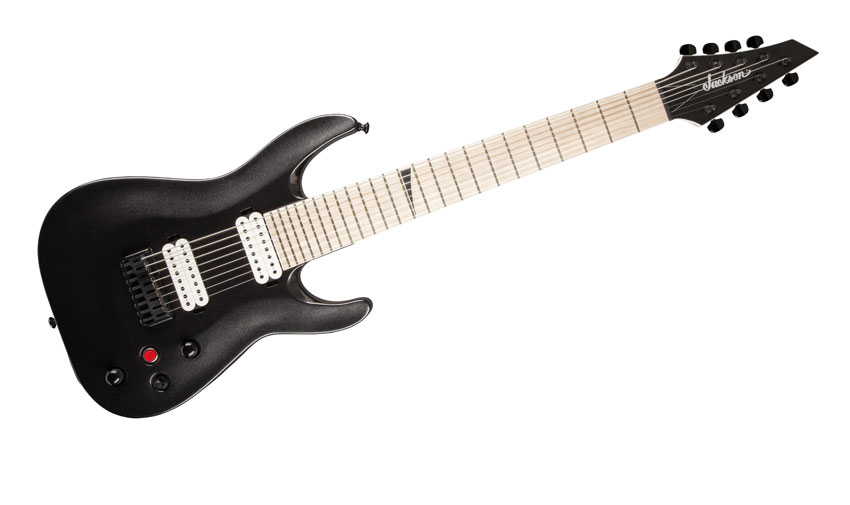MusicRadar Verdict
A guitar designed with the post-progressive metaller in mind - it takes the hot-rodded S-type concept to new extremes.
Pros
- +
Handles high-gain and low-tunings with ease, while clean tones are still useable. No batteries for pickups!
Cons
- -
Not the flashiest looks…
MusicRadar's got your back
Shopping for an eight-string electric is a bit like buying a guard dog. You're looking for all the same qualities: plenty of bark, more than a little bite and, err, a firm bottom-end. The usual rule applies - always buy from a reputable breeder. And you don't get much more reputable than Jackson, whose stock-in- trade is tailor-making electric guitars for musical roughhousing. And the firm has pulled out all the stops when spec'ing the DKA8.
"You could unbolt the maple neck and skate on it, such is its width"
This is the Dinky series, but put all thoughts of small and subtle out of your head. You could unbolt the maple neck and skate on it, such is its width, but the neck is flat-sawn and left satin-smooth to make the DKA8's extended range eminently accessible, and crucially, make the guitar playable. Two DiMarzio D Activator humbuckers in the solid alder body provide the firepower.
The rest of the DKA8's fixtures and fittings are just as impressive: the HT-8 hardtail bridge has a pleasingly low profile, and Planet Waves locking tuners help steady the ship. It might not be a looker - the Metallic Black finish looks a bit like the linoleum found on the floors of provincial nightclubs, the killswitch like it was purloined from a 16-bit coin-op arcade machine - but the DKA8 saves the flash for its performance.
Joking aside about the bottom- end, the low F# on an eight-string guitar must be responsive to the pick and in turn articulated by the pickups. This is how Meshuggah can sound like the world is falling on your head - there's definition in their chug.
High gain and low tunings are what the DKA8 handles really well. The clean tones, incidentally, are perfectly usable, with a good range between the warm elasticity of the neck pickup and the sharp clarity of the bridge 'bucker.
Whether at industrial levels of saturated distortion or glassy cleans, the DiMarzio D Activator continues to impress. One of the obvious advantages that the D Activators have over ubiquitous active EMG sets is that they don't need a battery, and yet still their output is gutsy, disciplined, and harmonically bright. Dial in some gain and there are some outrageous pinch harmonics to be had.
With a master tone, master volume and three-way pickup selector, the DKA8's controls hold few surprises, but the addition of a kill switch - a bright red button at that - completes a guitar designed with the post-progressive metaller in mind, and takes the hot-rodded S-type concept to new extremes.
An eight-string guitar is a game-changer for your playing and sound. Do you need to occupy the bass player's frequencies and write riffs that'll have you known throughout the rehearsal studio circuit and beyond as some sort of chug laureate? Then you definitely need an eight-string, and you'll definitely want this monster.
Jonathan Horsley has been writing about guitars and guitar culture since 2005, playing them since 1990, and regularly contributes to MusicRadar, Total Guitar and Guitar World. He uses Jazz III nylon picks, 10s during the week, 9s at the weekend, and shamefully still struggles with rhythm figure one of Van Halen’s Panama.
“I have an original 909 – every time I try to use it I feel like I’m ruining it”: House hero Riva Starr on his studio essentials and his love of analogue synths
“A synthesizer that is both easy to use and fun to play whilst maintaining a decent degree of programming depth and flexibility”: PWM Mantis review
“I feel like that song had everything we needed to come back with”: Bring Me The Horizon’s Lee Malia on Shadow Moses, its riff and the secrets behind its tone, and why it was the right anthem at the right time











